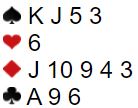You are East on defense after the auction shown below. Here is what you see when partner leads the eight of hearts (partnership agreement is to lead low from 3 or more cards when your partner has the suit). Declarer plays the ace from dummy, three by you, and deuce by declarer.
At trick two declarer leads the three of spades from dummy. Are you counting? What’s your plan for the defense?
Scroll down for my recommended plan.
There are two key clues to this puzzle:
- Partner started with doubleton or singleton heart, meaning opponents hold the top three heart honors (declarer has the queen). If partner has doubleton heart, opponents’ hearts are 3-3. If partner has singleton heart, declarer has four hearts to the queen.
- Opponents should hold at least 24 points, meaning partner holds at most 4 points.
Rise with the ace of spades at trick two and lead a heart. If partner ruffs, you will set the contract: ace of spades, heart ruff, top two diamonds.
If partner cannot ruff, opponents were always going to get the top three hearts. So, you have lost nothing. You may be able to find a fourth trick in the minor suits since partner has a little smattering of HCP. Make declarer do all the work to bring contract home.
